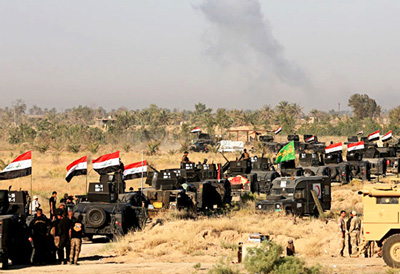
Vol. 80/No. 40 October 24, 2016
(front page)
Washington’s plans for Mosul attack sharpen conflicts over future in Iraq

At the same time, Moscow and the regime of Bashar al-Assad in Syria are pressing ahead in their murderous assault on opposition forces in the city of Aleppo, trying to shift the balance of forces in their favor before any further negotiations on a cease-fire.
Washington and its imperialist allies are too weak politically to directly intervene to impose anything resembling stability for their interests in Syria. While they accuse Moscow and Damascus of “war crimes,” the only road forward they see is to continue to seek accommodation and a truce with the Russian government.
With its latest deployment of 600 soldiers, Washington now has some 6,000 troops on the ground in Iraq, the highest number in years.
Baghdad and Ankara clashed sharply over the Mosul offensive. “We will play a role in the Mosul liberation operation and no one can prevent us,” said Turkish President Recep Tayyip Erdogan Oct. 1. Ankara has some 2,000 troops in northern Iraq.
“We have asked the Turkish side more than once not to intervene in Iraqi matters,” Iraqi Prime Minister Haider al-Abadi said Oct. 5, saying he feared a regional war. A spokesperson for the Shiite Popular Mobilization Force militias, which will fight with the Iraqi Army in Mosul, threatened to attack Turkish troops if they did not withdraw from Iraq.
“No one has the right to object to Turkey’s presence in Iraq when the country is fragmented,” stated Turkish Deputy Prime Minister Numan Kurtulmus Oct. 5. He added that Turkish troops were in Iraq at the invitation of the Kurdish government, training Kurdish peshmerga and Sunni militias to fight Islamic State.
An Oct. 5 article by the Rudaw news agency pointed out that the planned offensive will bring the Shiite militias into Nineveh province, of which Mosul is the capital, and potentially into conflict with the Kurds.
The peshmerga have expanded the region under Kurdish control by some 40 percent in the fight against Islamic State since 2014. This includes areas they say were traditionally Kurdish but were subject to decades of “Arabization” under the regime of Saddam Hussein.
The Shia regime in Baghdad today is known for its oppressive actions against the country’s minority Sunni population. This is an explosive factor affecting the maneuvering by all the contending allies preparing for what will emerge from the defeat of IS in Mosul.
The Kurdistan Regional Government says peshmerga fighters will not remain in Mosul, where the population is majority Sunni Arab. But KRG President Masoud Barzani has called for Kurds in the region to be allowed to vote on whether to join Iraqi Kurdistan.
There is no agreement on who will govern Mosul. Prime Minister Abadi intends to install Nofal Agoob, a Sunni politician and governor in Nineveh. But the province’s former governor, Atheel al-Nujaifi, heads a Sunni militia of some 5,000 that is trained by Ankara and works closely with the peshmerga.
Death, destruction in Aleppo
Russian and Syrian government warplanes are continuing their deadly bombardment of the opposition-controlled eastern half of Aleppo. The Syrian Observatory for Human Rights said Oct. 10 it has documented the deaths of 442 civilians in Aleppo from Russian and Syrian aerial attacks since Sept. 19. They reported 51 civilians killed by rebel shelling in government-held western Aleppo during the same period.Secretary of State John Kerry called for investigating “war crimes” by Moscow and Damascus Oct. 7, citing the bombing of hospitals in eastern Aleppo.
“War crimes also weigh on the shoulders of American officials,” responded Russian Foreign Ministry spokesperson Maria Zakharova. On Oct. 11 Russian President Vladimir Putin canceled a planned visit to Paris because French officials had joined in accusing Moscow of war crimes.
Washington and Moscow are waging an increasingly bellicose war of words as they jockey for advantage in any new truce. Moscow is particularly concerned about U.S military moves placing anti-missile batteries in eastern European countries that border Russia.
“There is a need to behave like partners and take each other’s interests into account,” Putin said Oct. 12.
Democratic presidential candidate Hillary Clinton and other politicians who call for more aggressive military action by Washington are floating the idea of imposing a “no fly zone” in Syria.
“To control all of the air space in Syria would require us to go to war against Syria and Russia,” Gen. Joseph Dunford, chairman of the Joint Chiefs of Staff, told a congressional hearing last month.
Moscow has recently strengthened its air defenses in Syria with batteries of S-300 missiles.
Related articles:
US-backed Saudi forces bomb Yemen
Front page (for this issue) | Home | Text-version home